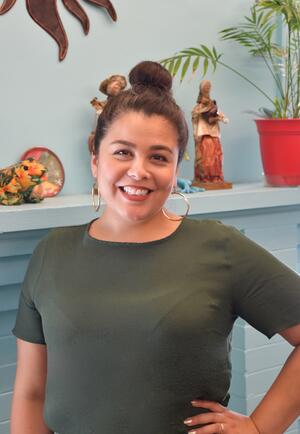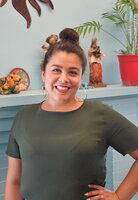Latina/Latino Studies major alum Dr. Monica Gonzalez Ybarra returned to campus this year as an assistant professor in the Department of Curriculum and Instruction. She graduated with a PhD in 2018 from the University of Colorado Boulder. Dr. Gonzalez Ybarra is from Bolingbrook, Illinois and was part of the first graduating class of Latina/Latino Studies majors at Illinois, graduating in 2011 with a double major in Latina/Latino Studies and Spanish. While she was born in Illinois, her extended family and ancestors are from South Texas and Mexico. Although she attended schools in suburban Chicago that provided her a rich and challenging education, she experienced discrimination from some educators who did not believe that she was capable to attend a school like the University of Illinois. This disheartened Monica and she went on to surprise her doubters and excel at Illinois.
As an undergraduate student Monica was active with her sorority and La Casa Cultural Latina. She was also active at Edison Middle School in Champaign. Her experiences working at the middle school coupled with her interests in teaching Spanish and Latina/Latino Studies led her to her current profession. During the beginning of her undergraduate years Latina/Latino Studies was not yet a major, but she later realized that her desire to be a Spanish teacher could be coupled with her interests in the new Latina/Latino Studies major.
“When I came in to the University I wanted to be a teacher. I knew I wanted to be in the classroom, working with youth. Through the organization I was a part of I was working with youth, doing community work through my role with my work-study, as a tutor at Edison Middle School. I loved working with high school students, so I was on track to be a Spanish teacher. At the same time I was taking LLS classes. It felt like what I was learning in my Latino Studies classes was not what I was learning in my Spanish as a Foreign Language courses, especially the courses that were going to prepare me to be a Spanish teacher. I felt this disconnect, that what I’m doing in Edison Middle School was not what I would be doing as a Spanish teacher. So at the time there was not a Latino studies major. I didn’t know what I was going to do. I didn’t want to be a Spanish teacher anymore. Taking Latino Studies classes, I decided I would also make it my major. It was when I was taking Dr. Cacho’s class, her citizenship and race class, that we just started talking about grad school. And I would have never thought of or known about grad school until that conversation. It’s crazy to me that I was a senior, almost ready to graduate with this other major, not really knowing what I was going to do with it that ultimately brought me here.”
Monica started her doctoral journey at the University of Utah in the Department of Education, Culture and Society. She completed a Master’s degree in Education and then went on to Boulder to pursue a PhD in literacy studies. She found that, “the work that I was doing in literacy was always with bilingual Latinx young people–how they use their bilingualism and knowledge, how they create language every day, with their experiences and where they are at geopolitically.” That is when she decided to focus on the language, literacy, and knowledge of Latinx youth.
Over the years as a graduate student and as a professor-in-training, Monica learned a lot about the improvements needed in the field of teacher education when it comes to the students who are in teacher education programs and the curriculum in these programs.
“What I know is an ongoing issue in the field of teacher education is that we have little representation of teachers of color. And I know from my experience-- I was one of the very few Latinas preparing to be a teacher when I was here. I’ve noticed from other places, as well, that nearly 90% of the teaching force is white women. One of the things that I really want to work on is getting more teachers of color in the College of Education, getting more students of color into our program here at Illinois. And for me it’s not just that they’re teachers of color, but coming from these ethnic studies backgrounds–Latino Studies, African American studies, indigenous studies, Asian American studies–so that they’re coming with this important knowledge to further support what they’re doing in the classroom. Because it’s not enough to just think about culture in the classroom. You have to think about the historical context of it. We have to think about the political. We have to think about what forms of oppression created these contexts for communities to have to survive in classrooms and to not have classrooms be a place where students are thriving. To work for a larger representation of perspectives in our classrooms by having teacher education students who are able to re-envision what education can look like because they have training in these other disciplines, that’s something I’m really looking forward to.”
Monica is passionate about changing the educational system to serve all students by creating a pipeline of teachers that are more representative of the population of the United States and who are trained to teach about cultural diversity. She is also passionate about working with youth in community.
“I love working with youth. I can’t wait to work with youth here in Champaign-Urbana, whether that be in school or in community spaces. My dream project would be to create a space where we have families, young people, pre-service teachers, and ethnic studies students together, where we see what it looks like to do community engagement work in education. To really be a teacher that draws on community, culture, language, and knowledge we have to be in the community. You have to be alongside your students and their families. And the only way you’ll know how to do that is if you are prepared with that experience.”
Since Monica has returned to campus she has become a faculty affiliate of Latina/Latino Studies. She has also become involved once again in La Casa Cultural Latina and is mentoring students. This spring she is teaching CI 415 Language Varieties, Cultures and Learning and in spring 2021 she will teach LLS 449 Issues in Latina/o Education.
“I am a product of amazing mentorship. For me part of being a Latina, being a Chicana student at U of I and coming back as a faculty member is about being available for students, seeing mentorship in a different way, and being the mentor that students need academically but also as a person–having someone on campus that you can trust, that you can share things with and know that they have your back.”

